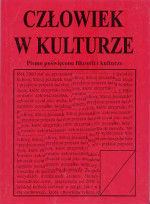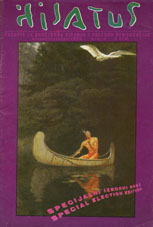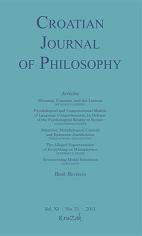
We kindly inform you that, as long as the subject affiliation of our 300.000+ articles is in progress, you might get unsufficient or no results on your third level or second level search. In this case, please broaden your search criteria.









Abstract. More often than not, discussions of moral responsibility centre on questions of determinism and free will. This makes sense, since the latter are logically related to responsibility. On the other hand, though, it certainly makes it more difficult to understand moral responsibility. Moral responsibility is a social phenomenon that occurs in social relations, i.e. in relations that make it possible for the society to function. In my philosophical approach to the concept of moral responsibility I stress its social nature. This is important to avoid interpreting responsibility in ways that differ significantly from what we are used to in our daily life.
More...
Abstract. Light and color are familiar basic traits of the visible world. The article discusses the problems which arise if we expect more from the sciences than a variety of information about particular conditions and aspects of light and color, i.e. if we expect an answer to the philosophical question: what are light and color? In trying to answer this question, science turns light and color into an insoluble riddle. This riddle cannot be solved unless scientific realism is subjected to a philosophical critique returning to the reality of the ‘Lebenswelt’ (E. Husserl) from which the meaning of scientific concepts and theories originates. This critical reflection would help philosophy preserve the primary reality of light and color in its irreducible totality for human experience.
More...
The willingness for the New Ethnos, wich will make possible the new self-defining and common identification comes to light. It is about the human desire for multiethnic consciousness, cosmopolitanism, wich knows the difference betwen the positive ethnic identity and empty nationalistic pathos. The intellectual dialoque, exchange relations, spirit of the community, multilinqual environment and tolerance are the password for the future, as well as the fact defined by the philosopher Sloterdijk: "Every human life by its structure /by its birth/ possesses the character of the immigration in some country, some nation, some population, some culture. Accordingly, we all can be defined as immigrants ... " We are all immigrants and emigrants on the rounded peace of land, where more than one World exist. Having been torn off from the entirety, we are falling into the strange World. The separation starts off somehow with the first scream, and it moves us around through the whole life, despite our desire to be together and unity with the world and our fellow-people.
More...
The American Constitution as the unique legal document is analysed in its historical background. The Founders were well-read, educated and prominent citizens thoroughly emerged in the Era of Enlightement, inspired by the pre-existing models of the civic society. The Roman Republic demanded a high degree of civic virtue and promoted the common good. John Locke's' concept of natural rights disagreed with the theory of exclusive rights enjoyed by certain groups, classes or nations of people. Locke defined natural rights in terms of liberty, life and property and he accepted them to be the core of humanity. The Founders ideas about government were influenced by a French writer Baron de Montesquieu who advocated a system of balanced and divided power and the idea of a mixed government. The JudeoChristian worldview occupied a special place in creation of the Constitution. The Founders insisted on "Providence" and the "Creator" who Endowed men certain unailenable rights". The period of Renaissance (means: "re-birth") animated intelectual life and rediscovered ancient Greek and Roman history. The idea of historical change and a progres flourished in that time. The individual relationship of government and religious institutions is reexamined. Magna Carta contributed to the development of constitutional government and limited the power of a ruler. The history had a great influence on the Founders. The reformation resulted in modern ideas about religion, individual rights and government. Being able to read the Bible in native tongues people were encouraged to cherish greater freedom of conscience. The Bost"n Masacre acelerated a document deafted by Thomas Jefferson - the Declaration of Indepedency. The Framers created the Costitution which was not universally acclaimed·and ratification gave vise to disputes of the most basic questions. The Philadelphia Convention ended with "a bundle of compromises". The final form of the constitution is conscise agreement with amendments, which is not the perfect solution to be copied by another states in need of democracy. There are some universal ideas of true democracy which should be accepted as the essential human rights. The basic human rigts must be mutually respected, otherwise war and insanity will prevail.
More...
Simonina misao u svakom slučaju nas trajno potiče da iznova promišljamo pitanje legitimnosti politike, demokracije, ljudskih prava, Europe, prisutnosti religije u javnom prostoru, pritom uvijek iznova propitujući sami sebe i djelujući prema onom što nam se u danom trenutku pokaže istinitim
More...
Interview woth Thomas Fleiner by Dejan Vanjek
More...
Lako mi se kao politologu, također, složiti s pledoajeom teologa Prcele za poslanje intelektualca koje podrazumijeva „aktivno se uključiti u događanja, ali ne kroz vođenje politike, nego korigiranje(m) čitave politike“, utoliko je „njegova zadaća probuditi zaboravljeno, povezati zanijekane činjenice i čimbenike, ukazati na alternativne putove…“ Takve intelektualce priželjkujemo, poručuje politolog u teologu, o.p. Frane Prcela, kako bi se nešto pokrenulo u „moru šutnje“ i u „učmaloj vodi“ u pravcu „dobronamjerne diskusije“. U protivnom, veli ovaj neobični dominikanski svećenik, ne preostaje nam drugo nego čak i javno uskliknuti: Avanti diletanti!
More...
U svojim tekstovima, uglavnom objavljenima nakon smrti, Simone Weil gorljivo je zaokupljena društvenom pravdom, položajem obespravljenih, iskorijenjenošću te osobnim čovjekovim odnosom prema Bogu. U prvoj fazi (do 1935.), u kojoj prevladavaju društvene i političke teme, Simone prihvaća Marxovu historijsko-materijalističku metodu, ali odbacuje marksistički utopizam i revoluciju. U drugoj fazi (od 1935. do smrti) prevladavaju povijesne i duhovne teme. Otvorena duhovnom blagu helenizma i hinduizma, Simone piše nadahnuta traganjima za kršćanskom autentičnošću. U posljednjim pak tekstovima bavi se odnosom pojedinca i zajednice te problemima iskorijenjenosti kakvi posebice postaju očitima u kriznim vremenima (J. Brnčić) Odabrani ulomci uzeti su iz knjiga: Iščekivanje Boga, prev. Marko Kovačević, Kršćanska sadašnjost, Zagreb 1979. (IB); Nadnaravna spoznaja, prev. Mirjana Dobrović, Naklada Ljevak, Zagreb 2000. (NS); Ukorijenjenost: preludij za deklaraciju o dužnostima prema ljudskom biću, prev. Marko Kovačević, Nakladni zavod Globus, Zagreb 2003. (U); Težnja i milost, prev. Ana Buljan, Težnja i milost, prev. Ana Buljan, Europski glasnik, god. VII, br. 7, Društvo hrvatskih književnika, Zagreb 2002., str. 176-274.(TM)
More...
This paper explores how words relate to concepts. It argues that in many cases, words get their meanings in part by associating with concepts, but only in conjunction with substantial input from language. Language packages concepts in grammatically determined ways. This structures the meanings of words, and determines which sorts of concepts map to words. The results are linguistically modulated meanings, and the extra-linguistic concepts associated with words are often not what intuitively would be expected. The paper concludes by discussing implications of this thesis for the relation of word to sentence meaning, and for issues of linguistic determinism.
More...

In Naming and Necessity, Kripke argues that clearly conceived (or imagined) scenarios that seem to be counterexamples to a posteriori identity theses can indeed count as evidence against them—but only if, after reflection on our understanding of their constituent terms and the relevant empirical facts, we find that they cannot be acceptably reconstrued as intuitions about something else. This makes trouble for phenomenal-physical identity statements such as ‘pain is C-fiber stimulation’, since most agree that such statements cannot be so reconstrued—and thus some materialists reject Kripke’s account of the link between conceivability and possibility entirely. In my view, however, this is a mistake, since it impoverishes our resources for evaluating a posteriori modal claims; the better strategy for materialists is to show that phenomenal-physical identity statements comprise a special class of statements to which Kripke’s general strategy does not apply. In this paper I contribute to this project by examining, and challenging, Stephen Yablo’s (2005) general objections to Kripke’s strategy, and sketch a principled way to draw a distinction between phenomenal-physical identity statements and other a posteriori modal claims.
More...